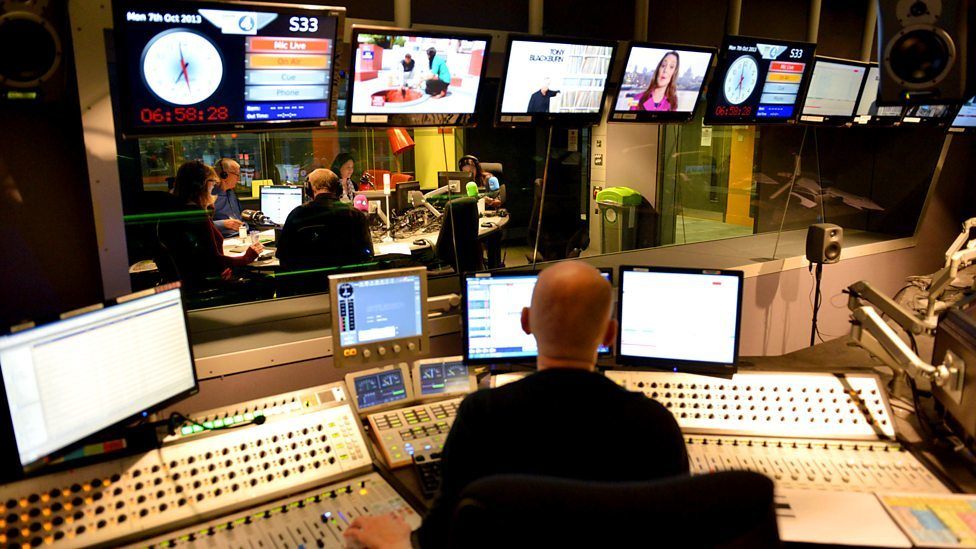Credit: Youtube

Every time I visit the United States of America I do something I never do in my own country and rush to the television remote controls. Whereas an evening flicking between the channels in Britain is an evening plunged first into depression and then into nihilism, the sheer range, volume and pizzazz of American media mesmerises me. Whole hours are lost staring into that beautiful void.
For instance, there is the grim fascination of watching Rachel Maddow on MSNBC deliver her nightly political monologues. Or, rather, sermons, since these pronouncements seem utterly uninterested in shifting the opinion of anybody not already wholly in lockstep with her political worldview. And until recently we were able to watch the great nightly spectacle of Fox’s Bill O’Reilly, a man whose eponymous show became a pure marketing opportunity for the rest of his media empire. How anyone brought up on British advertising standards in broadcasting marvelled at the sight of O’Reilly using his show to promote first one of his books, and then – after the break – another (the first through rebutting a critic, the second through an interview with the star of the forthcoming movie of his previous book).

In recent years, the much-talked about bifurcation of American media (and the question of whether the media caused the divide or the divide caused the media naturally remains unsolved because it’s unsolvable) has reached new depths. First in the creation of parallel versions of the nation’s history, so that Republicans now have a regularly updated library of books explaining why all the ills of the world were approved of or caused by supporters of the Democratic Party, while Democrats now have the advantage of piles of tomes explaining why, coincidentally, it is the Republicans who have been guilty of precisely the same. Again, whether this has created the nation’s present politics or the politics caused this is a question that is unsolvable.
But that all this has reached some kind of crisis is hard to deny. On my last visit to the US last month I flicked between two stations. On one the host was explaining the imminent prosecution of Hillary Clinton. One single press of the remote control and I was in another universe – this one in which the host was explaining to the viewers the timeline for the imminent impeachment and prosecution of Donald Trump.
Of course, American readers will object that all this is only possible to enjoy because it’s not a disease from which my own country suffers. Whatever other problems we have in Britain’s media – and we have plenty – these at least are not among the national ailments, and so it is possible to look on them with the almost lascivious sympathy of a concerned friend.

But it is only when you consider the extremities of the problem now corroding the American media that the British media looks remotely bearable and even admirable. A standard gripe in the UK remains the presence of the BBC – a media organisation which can send you to prison if you do not pay the necessary tax for the organisation’s output. The knowledge that we pay for the BBC seems to make it hard for some people not to view its journalists as their employees and all differences with strongly-held opinions of their own as a form of insubordination. Again there is much to be said against the corporation. The BBC’s website has helped to destroy local news organisations. Its political impartiality is doubted by both sides, with many conservatives accusing it of a leftist bias and an increasing number of Corbynistas appearing to believe that the corporation is merely a mouthpiece of Conservative Campaign Headquarters. All of which creates one temptation in particular to those employed at the BBC – which is to say ‘Well since we get all of these negative accusations from each side we must be doing something right.’
It is not only journalists at the BBC who are vulnerable to this fallacy (being equidistant between two vocally critical and erroneous positions is more likely to see you in the wrong than the right), but as a news corporation with an unusual responsibility to the public such a cop-out is especially tempting.
Now that Newsnight has become an almost unwatched slot, the BBC programme that is now unequalled in the amount of criticism it gets is the Today programme on BBC Radio 4. Most recently, under its new editor Sarah Sands, it has been accused of ‘dumbing down’. This complaint almost solely focussed on the recent decision to include a set of uncritical and somewhat fawning puff packages on London Fashion Week. But even the backlash to that decision proved one thing in particular – which is that the British public still consider the Today programme to be a jewel. It is only because rigorous standards are expected that people express their feelings of disappointment in the programme. It is inconceivable that there would be a serious wave of criticism if Rachel Maddow, or Bill O’Reilly in his day, had been seriously suspected of dumbing down. Or up.
And even the most vociferous critics of Today cannot deny that the programme retains a power which is unusual in the age of cable news and social media. If the Today programme chooses to focus on a subject, then that subject will become news even if it has not previously been. Anybody who has been a guest will also know that it is that rare type of show, where an appearance on it leads to a succession of subsequent media bookings throughout the day, and also guarantees a string of messages from people you have not heard from in years. If ‘event’ programming still exists in the digital age, then the Today programme is the nearest thing to it.

But for the media and political culture as a whole the fact about the Today programme which stands out – as its recent 60th birthday celebrations reminded us – is that politicians must go on it. If there is a story about something which relates to a Cabinet minister then that Cabinet minister or a colleague must go on and be interviewed about the story. There is a criticism levelled at the presenters of the programme – a criticism which varies in its accuracy between presenters – that they do not allow such interviewees to speak. And it is true that the programme’s interview style tends towards a first question which is contestable followed by a second claiming that the interviewee has already contradicted themselves.
But despite these and many other cavils, it remains inconceivable that a Republican politician with important points to make or defend would be invited onto Rachel Maddow’s show and given a fair hearing. Any more than it is that a Democrat would have been invited onto Bill O’Reilly’s show and heard out. Knowing that such an appearance would not be an interview but an invitation to a carefully prepared public hanging, such politicians stay away. And so the trench on each political side is dug a little deeper, and the ability to understand different political points of view – to talk with each other, rather than just about each other – becomes a little more impossible. No media is perfect, but after six decades of news-setting, and six decades of causing cups of tea to be slammed angrily on breakfast tables up and down the country, it is worth acknowledging such media success stories as we have.










Join the discussion
Join like minded readers that support our journalism by becoming a paid subscriber
To join the discussion in the comments, become a paid subscriber.
Join like minded readers that support our journalism, read unlimited articles and enjoy other subscriber-only benefits.
Subscribe